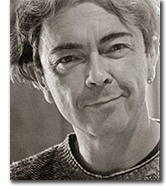
- associate professor and director of graduate studies in the Department of Philosophy
- 2015-2016 Altman Fellow in the Humanities Center
- published a book in 2010 called Contingency, Time, and Possibility: An Essay on Aristotle and Duns Scotus
- currently writing on ancient theories of perception
Background
"I was born in Brittany, France and grew up in Paris. In France I received several degrees (Ecole Normale Supérieure, Maîtrise, DEA, Agrégation) which do not have an exact equivalent in the U.S. Eventually I completed my PhD at Vanderbilt University.
"I was naturally drawn to philosophy. Philosophy is taught in French high schools; everyone has to take it during their senior year. I remember that on the first day of the school year I had two periods in philosophy from 8 to 10 am, with a ten-minute break between periods. At the end of the first period, during the break, I decided that this is what I wanted to do.
"I was a good student, but there was always something missing. I could learn, repeat, and re-explain things, but questions about the meaning of what we are doing were always postponed or avoided by my professors. Most mathematics professors do not want to ask whether mathematical objects are real, whether they are part of nature, or whether mathematics is a symbolic language used to translate what we observe. Philosophers are concerned with these questions. Likewise, in history we learned, for example, the main dates and important events of World War I or World War II, but whether history has a purpose is a question history professors rarely want to address.
"I suppose I'm curious by natural inclination. It seems to me that every time I open a question or inquiry into an avenue, new questions are going to come up immediately that I want to continue exploring.
"The best reason to study philosophy is that it's incredibly interesting! Philosophy is a kind of thinking that is concerned with the examination of beliefs of the most fundamental kind—beliefs that structure our lives, shape our worldviews, and underpin all academic disciplines."
Teaching
"I teach a variety of classes. Every fall semester I teach PHL 301, Ancient Philosophy. My special area is the history of Western philosophy, particularly ancient and medieval. In addition, I teach upper-level and graduate seminars in ancient philosophy. I often teach the capstone seminar in metaphilosophy.
"On a regular basis I also teach various introductory courses, such as Theories of Human Nature, which is a popular introduction to philosophy.
"What I enjoy most about teaching is the unexpected interaction with students. When they come up with something that I did not think of, this disrupts the lesson plan in a good way, in a way that is really creative and interactive.
"Typically I do not follow one pedagogical format but use a combination of approaches. I lecture, then run a class discussion or break the class into groups. Just about every week we do a little bit of each. I believe in variety rather than the same format every class."
Research
"Last year I wrote an essay (a book chapter) on medieval theories of properties. It's about an important debate that raged during the twelfth and thirteenth centuries on the justification of the mine/thine distinction and the possibility to voluntarily renounce property. This summer I just finished an article on Diodorus Cronus, a Greek philosopher and dialectician who lived in the third century BCE.
"Finally, I am now an Altman Fellow with the Humanities Center. The topic for 2015-2016 is "The Senses." I am working on a piece that deals with the notion of 'common sense' (sensus communis). Aristotle observed a long time ago that we do not simply sense sensible objects (taste coffee, see a color, touch a hot stove, etc.), but we also sense that we sense these things. This meta-perception (which ancient philosophers called common sense) accompanies all conscious perceptions."
Outside the Classroom
"I'm going to try hang-gliding next month. I'm pretty excited about it!"
[August 2015]
 Miami University Oxford, Ohio est. 1809
College of Arts and Science
Miami University Oxford, Ohio est. 1809
College of Arts and Science
 Miami University Oxford, Ohio est. 1809
College of Arts and Science
Miami University Oxford, Ohio est. 1809
College of Arts and Science